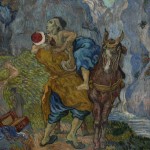 What a fantastic and often underestimated gift the Lectionary is! Each day the Lectionary juxtaposes readings from Moses and the Prophets with the Gospels in order that we may hear Christ’s messianic mission pronounced clearly. Each time I read the daily readings I consider what purpose the Church had in mind and often I find myself thinking with greater effort than if I hadn’t kept it in mind. So it produced fruit to ask this question about the readings; why were these two passages put together?
What a fantastic and often underestimated gift the Lectionary is! Each day the Lectionary juxtaposes readings from Moses and the Prophets with the Gospels in order that we may hear Christ’s messianic mission pronounced clearly. Each time I read the daily readings I consider what purpose the Church had in mind and often I find myself thinking with greater effort than if I hadn’t kept it in mind. So it produced fruit to ask this question about the readings; why were these two passages put together?
The readings for Monday October 5th 2009 (Jonah 1:1-16 & Jonah 2:1-11, Luke 10:25-37) perplexed me at first because the Gospel wouldn’t have been the one I would have chosen. There are plenty of Gospel readings to pair with the story of Jonah. For instance there’s Matthew 12:40, which describes Jesus directly quoting Jonah regarding a sign of the messiah. There’s also Mark 4:35-40, which depicts Jesus asleep while the Apostles fear for their lives sailing through a tempest, just as Jonah sleeps through the tempest (Jonah 1:5-6). Then there’s the parable of the Good Son (Matthew 21:28-31) and also the parable of the Prodigal Son, both of which nicely parallel Jonah’s reluctant journey and bitterness over Nineveh’s salvation (which readings follow latter in the week). We could look to the Pentecost (Acts 2:36-38) readings where the people seek to be cleared of shedding Christ’s innocent blood, just as the sailors in Jonah seek acquittal (Jonah 1:14). If we keep looking, I’m sure we’ll find more gospel readings to compare with Jonah. Yet, there was a reason why Luke was chosen over Mathew (other than this being year B, Cycle I).
What do the two readings have in common or else how are they opposed? Both Jonah and the scholar evading what God asks of them. Jonah is literally fleeing away from God while the scholar is trying to justify himself. And in each case mercy prevails. What motivated Jonah to have the men throw him overboard? Jonah knew it was his disobedience that brought calamity upon the others. He is not so innocent but even so, only a repentant and righteous man would forfeit his life for others. This is an act of mercy, so it’s easy to see Jonah as Christ like. Also when God responds to Jonah’s prayer’s and commands the fish to spew him out, this too is mercy. In the gospel parable Jesus is the personification of both the victim and the Good Samaritan and it is this example that Jesus asks the scholar and each of us to emulate. Even though the scholar’s motive was to test Him, Jesus did not condemn but rather let him, “Go and do likewise.”